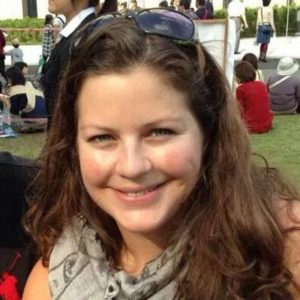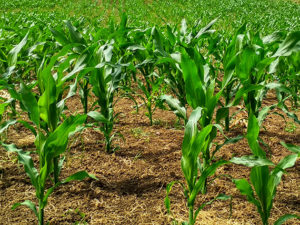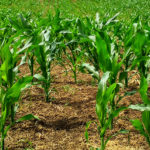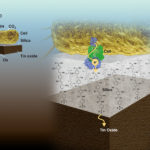The American Society for Cell Biology (ASCB) has selected Eva Nogales, a senior faculty scientist in Molecular Biophysics and Integrated Bioimaging (MBIB) and a Howard Hughes Medical Institute (HHMI) investigator and professor at UC Berkeley, as this year’s recipient of the Sandra K. Masur Senior Leadership Award. The award recognizes an outstanding scientist with a record of active leadership in mentoring both women and men in scientific careers. Nogales will be honored at the ASCB Annual Meeting in December 2018. Nogales was also elected by ASCB members to serve on the society’s executive committee as president-elect in 2019, president in 2020, and past president in 2021.
Mortimer Participates at AAAS Forum on Science & Technology Policy
 Jenny Mortimer, Deputy Vice President of the Feedstocks Division at the Joint BioEnergy Institute (JBEI) and Scientist with the Environmental Genomics and Systems Biology (EGSB) Division, participated at a 2018 AAAS Forum on Science & Technology Policy panel entitled “Science Competitiveness in Relation to Public Support for Science”. Panelists discussed how the scientific community must work to maintain societal relevance and build trust. Mortimer presented a code of ethics for scientists recently developed by the World Economic Forum’s Young Scientists community. The code serves as a tool to nurture a positive change of culture in the research world by not only guiding and shaping the behavior of individuals but also the processes of the scientific institutions that are to facilitate this cultural shift.
Jenny Mortimer, Deputy Vice President of the Feedstocks Division at the Joint BioEnergy Institute (JBEI) and Scientist with the Environmental Genomics and Systems Biology (EGSB) Division, participated at a 2018 AAAS Forum on Science & Technology Policy panel entitled “Science Competitiveness in Relation to Public Support for Science”. Panelists discussed how the scientific community must work to maintain societal relevance and build trust. Mortimer presented a code of ethics for scientists recently developed by the World Economic Forum’s Young Scientists community. The code serves as a tool to nurture a positive change of culture in the research world by not only guiding and shaping the behavior of individuals but also the processes of the scientific institutions that are to facilitate this cultural shift.
JGI Helps Identify Core Microbial Community for Maize Rhizosphere
 A plant’s health is affected not only by conditions such as water and temperature, but by the microorganisms that live around its roots. The rhizosphere microbiome, as this microbial community is known, regulates nutrient availability to the plant from the soil, and can impact plant growth and yields. Published the week of June 25, 2018 in the Proceedings of the National Academy of Sciences (PNAS), researchers report on the results of a large-scale field study that partially replicates earlier trials to identify soil microbes that colonize plants and which can be associated with particular traits. The work was conducted by an international team led by scientists at the Max Planck Institute for Developmental Biology (MPI), the Howard Hughes Medical Institute at the University of North Carolina at Chapel Hill (UNC), and Cornell University, and includes JGI researchers. Learn more on the JGI website.
A plant’s health is affected not only by conditions such as water and temperature, but by the microorganisms that live around its roots. The rhizosphere microbiome, as this microbial community is known, regulates nutrient availability to the plant from the soil, and can impact plant growth and yields. Published the week of June 25, 2018 in the Proceedings of the National Academy of Sciences (PNAS), researchers report on the results of a large-scale field study that partially replicates earlier trials to identify soil microbes that colonize plants and which can be associated with particular traits. The work was conducted by an international team led by scientists at the Max Planck Institute for Developmental Biology (MPI), the Howard Hughes Medical Institute at the University of North Carolina at Chapel Hill (UNC), and Cornell University, and includes JGI researchers. Learn more on the JGI website.
Ultrathin Membrane Both Isolates and Couples Living and Non-Living Catalysts
Biosciences researchers have developed a novel nanoscale membrane embedded with molecular wires that simultaneously chemically isolates, yet electrochemically couples, a microbial and an inorganic catalyst on the shortest possible length scale. This new modular architecture, described in a paper recently published in Nature Communications, opens up a large design space for building scalable biohybrid electrochemical systems for a variety of applications.
Biosciences Affiliate John T. Lyman Passes Away
The Berkeley Lab community mourns the loss of John Tompkins Lyman, who died May 30 at age 86. He was a key member of the pioneering radiation biophysics group led by Cornelius Tobias and John Lawrence, studying how the beams from the cyclotrons built by John’s brother Ernest could be applied in biology and medicine.
- « Previous Page
- 1
- …
- 118
- 119
- 120
- 121
- 122
- …
- 213
- Next Page »
Was this page useful?







